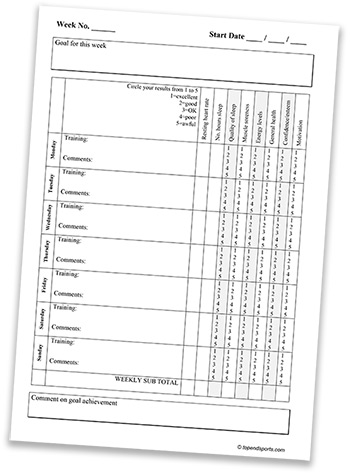 During a period of training, many athletes will experience physiological and emotional stresses which can influence how well you train, compete and recover.
During a period of training, many athletes will experience physiological and emotional stresses which can influence how well you train, compete and recover.
A training diary can be used to monitor your body's responses to a range of physiological and psychological parameters. Look for specific changes which may indicate unwanted stress on the body.
Get your free copy of our weekly fitness training diary. The file is a pdf which you can print out as many times as you like.
Enter your email address and you will be sent a link to download the file.
* Submitting your email address will also subscribe you (100% free) to the Topend Sports newsletter, containing top breaking news in sport, science, fitness and nutrition. Don't worry, you can easily unsubscribe at any time, but I don't think you will want to. As well as great information, you will get more freebies and other great offers!
The fitness training daily diary is just one way for you to monitor subjectively and objectively how well you are coping, while enabling you to recognise the body's physiological and psychological responses.
Guide to Completing the Fitness Training Diary
This diary is useful for monitoring your body's responses to training. Look for specific changes which may indicate unwanted stress on the body. A certain amount of stress is quite normal and tolerable for most people however, when it does become too much the body will shows signs of over-training. This can manifest itself in a variety of different forms depending on the type of stress and the individuals' ability to cope.
Please fill in the answer to each of the questions early each morning, prior to breakfast. It is important that each area is given an honest appraisal.
Resting Heart Rate
Resting heart rate (the number of beats per minute) should be taken after a few minutes (2-5 minutes) upon waking whilst still in bed. Give you body some time to adjust to the change from sleeping before taking your pulse. Changes to resting heart rates can indicate adaptation processes, or just a normal responses to the previous days training load. Resting heart rates can also be affected by ensuing illness and overtraining. Once a normal resting heart rate has been established it becomes easy to determine your physiological state. If your resting heart rate is 10 beats per minute or greater above normal then please let your coach or sport scientist know.
Sleep length and quality
The number of hours of sleep and the quality of sleep can play a big part in your ability to cope with your training and playing. Sleep provides regeneration and restoration of the body's systems to allow you to train and adapt accordingly each day. Troubled sleeping is also a symptom of tiredness/overtraining and should be noted. You should have at least 8-10 hours sleep each night, and you should try to get up and go to bed at the same time each day.
Muscle Soreness
A general rating of muscle soreness can tell us information about how well you are recovering from your training and work.
Energy Levels and General Health
It is important to know about your general physical well being, as it can impact on all areas of your daily life. Please give a general indication of your energy level and health level.
Confidence and Motivation
As well as your physical health, it is also important to monitor you physiological well being. Please give a general indication of your current level of confidence and self-esteem, and how motivated you are feeling.
Related Pages
- Other articles on planning an exercise program
- See also the 'Planning to Train' Tips
- Other fitness downloads


 Upcoming Events
Upcoming Events